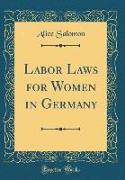Labor Laws for Women in Germany (Classic Reprint)
BücherAngebote / Angebote:
Excerpt from Labor Laws for Women in GermanyThe factory law of Germany differs from French or English, in so far as it does not constitute a separate body of enactments, and 15 not distinct, as with us, from provisions against truck, control of markets, or regulation of contract between employer and employed. The German factory law forms a part of the industrial code of the empire Which applies as a whole to all trades and industries. The scope of the industrial code is very wide, and includes infer (did the formation of guilds and work men's committees, the regulation of the labour contract, the arbitra tion of disputes, the regulation of labour organisations, etc. Prussia, as might have been expected, took the initiative in industrial legislation, and afterwards imposed the same legislation, with some modifications and exceptions, upon the whole Empire.The Edict of 1807 abol1shed serfdom in Prussia, and made free the right to possess land. In 1808 a circular was issued proclaim ing the right of citizens to engage in such occupations as they desired. Exclusive privileges and industrial monopolies were abolished in several subsequent orders. In 181 1 industry was freed by removing the compulsory membership of trade guilds, and permitting persons not members to employ labour and have apprentices. In 1845 an impor tant Labour Act (gewerbeordnung) was passed, which confirmed and extended industrial liberty, and removed some still-existing restrictions. But it also made an effort to maintain the old guilds, in order that the education of apprentices might be preserved and safeguarded. The exercise of a trade was subordinated only to the possession of the necessary aptitude for its prosecution, to a fixed domicile, and to a declaration to the local authorities. In exceptional cases only, where special intelligence was required, or the industry was dangerous to the public, Were special authorisations required. This provision is still in force the law enumerates certain dangerous or unhealthy trades, which are only to be carried on subject to special authorisation, which is dependent on the fulfilment of specified conditions of health and safety. Such are, for instance, chemical and gas works, foundries, starch factories, wool-sorting works, lead enamelling works, and others. The conditions of authorisation may and often do include conditions for the protection of workers employed. It is interesting to see that this regulation, which has attracted the attention of foreign observers and is rightly regarded as one of the most advanced provisions ofexisting factory law, is connected through the enactment of 1845 with the regulations of the ancient guilds.About the PublisherForgotten Books publishes hundreds of thousands of rare and classic books. Find more at www.forgottenbooks.comThis book is a reproduction of an important historical work. Forgotten Books uses state-of-the-art technology to digitally reconstruct the work, preserving the original format whilst repairing imperfections present in the aged copy. In rare cases, an imperfection in the original, such as a blemish or missing page, may be replicated in our edition. We do, however, repair the vast majority of imperfections successfully, any imperfections that remain are intentionally left to preserve the state of such historical works.
Folgt in ca. 10 Arbeitstagen
